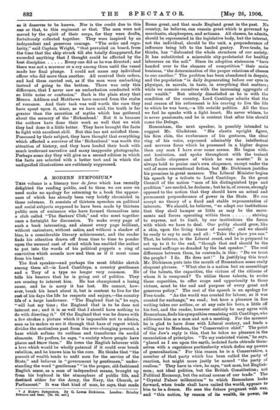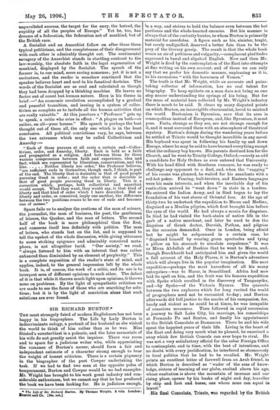A MODERN SYMPOSIUM.*
THIS volume is a literary tour de force which has recently delighted the reading public, and to them we are sure we need make no apology for returning to a book the appear- ance of which has already been very briefly chronicled in these columns. It consists of thirteen speeches on political and social subjects supposed to have been made by thirteen public men of eminence who have formed themselves into a club called " The Seekers Club," and who meet together once a fortnight for discussion. To make every page of such a book interesting, and almost every page brilliant, without caricature, without satire, and without a shadow of bias, is a considerable literary achievement, and the reader finds his attention drawn off from time to time to ponder upon the unusual cast of mind which has enabled the author to put into the words of his political puppets a ring of conviction which sounds now and then as if it must come from his heart.
The first speaker—and perhaps the most lifelike sketch among them all—is Lord Cantilupe, a country gentleman and a Tory of a type no longer very common. He tells his hearers that he is going out of politics. They are ceasing to interest him. He has championed a losing cause, and he is sorry it has lost. He cannot, how- ever, break his heart about it, but is content to live for the rest of his days the life he respects and enjoys,—the country life of a large landowner. " The England that is," he says, "will last my time ; the England that is to be does not interest me ; and it is as well that I should have nothing to do with directing it." Of the England that was be draws with a few strokes a picture which it is impossible not to admire, seen as he makes us see it through that haze of regret which divides the motionless past from the ever-changing present, a haze which softens its outlines and transforms its sordid elements. He prefers, he says, "a society where people have places and know them." He loves the English labourer with a love which would be wholly paternal if it could ever brook rebellion, and he knows him to the core. He thinks that " the pursuit of wealth tends to unfit men for the service of the State," and believes in "government by gentlemen," under- standing the word "gentleman" " in the proper, old-fashioned English sense, as a man of independent means, brought up from his boyhood in the atmosphere of public life, and destined either for the Army, the Navy, the Church, or Parliament." It was that kind of man, he says, that made
• A Modern Symposium. By G. Lome Dickinson. London: Briailey Johnson and Ince. [2a. od. net.]
Rome great, and that made England great in the past. No country, he believes, can remain great which is governed by merchants, shopkeepers, and artisans. All classes, he admits,
should be represented in the legislative body, but the interest, not the individual, should be the unit, a preponderance of
influence being left to the landed gentry. Free-trade, he thinks, has "dislocated the whole structure of our society. It has substituted a miserable city-proletariat for healthy labourers on the soil." Since its adoption statesmen " have handed over to the chances of competition " their main business, "the determination of the proper relations of classes to one another." The problem has been abandoned in despair, and the population " is daily degenerating before our eyes in physique, in morals, in taste, in everything that matters ; while we console ourselves with the increasing aggregate of our wealth." But utterly dissatisfied as he is with the condition of the country, Lord Cantilupe admits that the real reason of his retirement is his craving to live the life to which be was born,—a life outside politics. All the time we feel he speaks with a light heart. He never whines, be is never passionate, and he is content that after him should come the Deluge.
Remenham, the next speaker, is possibly intended to suggest Mr. Gladstone. " His elastic upright figure, his firm chin, the exuberance of his gestures, the clear ring of his voice, expressed admirably the intellectual and nervous force which he possessed in a higher degree than any man I have ever come across. He began with- out hesitation, and spoke throughout with the trained and facile eloquence of which he was master." It is always bold to praise one's own eloquence, except under the veil of more conventional fiction, but Mr. Dickinson justifies his promises in great measure. The Liberal Minister begins his speech by a tribute to Lord Cantilupe. In the great Council of the nation " men of his distinguished type and tradition " are needed, he declares ; but he is, of course, strongly opposed to the notion that they should have an actual and permanent preponderance of power in the State. He can accept no theory of a fixed and stable representation of interests. We should, he believes, "so adapt our institutions that they shall hamper as little as may be the move- ments and forces operating within them striving to express, not to limit, by our institutions the forces with which we have to deal. Our polity should grow, like a skin, upon the living tissue of society," and we should be ready to say to each and all : " Take the place you can."
That, he believes, is the Liberal creed, and he is prepared to act up to it to the end, " though that end should be the universal suffrage so_ dreaded by the last speaker." The real difference between them, he contends, is this : "Do we trust the people ? I do. He does not !" In justifying this trust Mr. Dickinson puts into the mouth of Remenham some really eloquent phrases. "What else is a nation but an assemblage of the talents, the capacities, the virtues of the citizens of whom it is composed? To utilise those talents, to evoke those capacities, to offer scope and opportunity to those virtues, must be the end and purpose of every great and generous policy." The rest of the speech is an apology for Free-trade. "As the world was created for labour, so it was created for exchange," we read; but here a pleasure in fine writing takes our author, or at any rate his hero, a little off his feet, and the reader, however entirely he may agree with Remenham, finds his sympathies remaining with Cantilupe, who addresses him as a man and not a meeting. For the moment he is glad to have done with Liberal oratory, and lends a willing ear to Mendoza, the " Conservative chief." The point of the Jew's reply is this, that he takes no pleasure in the enunciation of principles. "To my restricted vision," he says, "placed as I am upon the earth, isolated facts obtrude them- selves with a capricious particularity which defies my powers of generalisation." For this reason he is a Conservative, a member of that party which has been called the party of reaction, but might more justly be named " the party of realism." They have in view, he says, "not man, but English- men ; not ideal polities, but the British Constitution; not Political Economy, but the actual course of our trade." The
" Crystal Palace millennium " to which Remenham looks forward, when trade shall have united the world, appears to him to be a dream. He sees the future pregnant with war, and " this nation, by reason of its wealth, its power, its
unparalleled success, the target for the envy, the hatred, the cupidity of all the peoples of Europe." Yet he, too, has beams of a federation, the federation not of mankind, but of the British race.
A Socialist and an Anarchist follow on after these three typical politicians, and the completeness of their disagreement with each other is admirably thought out. The sentimental savagery of the Anarchist stands in startling contrast to the law-worship, the absolute faith in the legal regeneration of mankind, displayed by the Socialist. The speech of the former is, to our mind, mere raving nonsense; yet it is not a caricature, and the reader is somehow convinced that the speaker believes heart and soul in his fanatical doctrine. The words of the Socialist are as cool and calculated as though they had been dropped by a thinking machine. He leaves no factor out of count but human nature. Here is his theme in brief :—" An economic revolution accomplished by a gradual and peaceful transition, and issuing in a system of collec- tivism so complete as to include all the human activities that are really valuable." At this juncture a "Professor" gets up to speak, a critic who cries in effect : "A plague on both—or rather, on all—your houses." His speech is perhaps the best thought out of them all, the only one which is in the least conclusive. All political convictions vary, he says, between the two extremes which may be called Collectivism and Anarchy
Each of these pursues at all costs a certain end—Collec- tivism, order, and Anarchy, liberty. Each is held as a faith and propagated as a religion. And between them lie those various compromises between faith and experience, idea and fact, which are represented by liberalism, conservatism, and the
like Neither liberty nor order," the Professor believes, "are sufficient ends in themselves, though each, I think, is part of the end. The liberty that is desirable is that of good people pursuing Good in order ; and the order that is desirable is that of good people pursuing Good in liberty. This is a correction which, perhaps, both collectivist and anarchist would accept. What they want, they would say, is that kind of liberty and that kind of order which I have described. But as liberty and order, so conceived, imply one another, the difference between the two positions ceases to be one of ends and becomes one of means."
Space fails us to analyse the orations of the man of science, the journalist, the man of business, the poet, the gentleman of leisure, the Quaker, and the man of letters. The second half of the book is more philosophical than the first, and concerns itself less definitely with politics. The man of letters, who stands last on the list, and is supposed to tell the upshot of the whole discussion, while giving utterance to some striking epigrams and admirably conceived meta- phors, is not altogether lucid. " Our society," we read, "always listened to him with an interest that was rather enhanced than diminished by an element of perplexity." This is a complete exposition of the reader's state of mind, and applies, indeed, to the general impression left by the whole book. It is, of course, the work of a critic, and its use is to interpret men of different opinions to each other. The defect of it is that while it throws much light upon opinions, it throws
none on problems. By the light of sympathetic criticism we are made to see the faces of those who are searching for solu- tions; but it is by the light of conviction alone that such solutions are ever found.











































 Previous page
Previous page